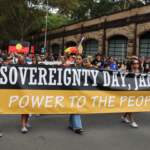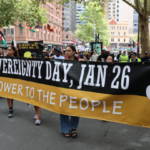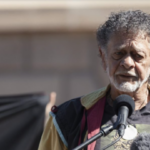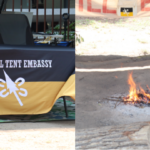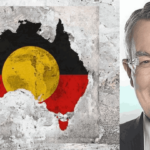Reoccupying Illegally Acquired Wiradjuri Country: An Interview with Uncle Paul Towney
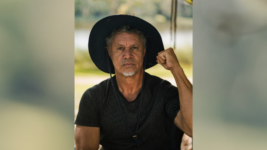
Wiradjuri elder Paul Towney began occupying a parcel of land of over 2,000 acres in size said to be owned by Charles Sturt University in the NSW regional town of Orange, as he came to understand that when that land was initially acquired by British subjects under an 1823 land grant issued by Thomas Brisbane then governor of the colony of New South Wales, the process was unlawful.
Towney reoccupied the land on the grounds of Charles Sturt University due to the ruling involved in the 2024 Federal Court case Dungog Shire Council versus Attorney General of New South Wales, which involved Paterson Sportsground in the NSW lower Hunter Region, as it had formed part of a 2,090 acre land grant that Brisbane signed over to British subject James Phillips in 1823.
Dungog Shire Council sought to determine that native title was extinguished over Paterson Sportsground via the 1823 grant.
The court found, however, that under 1821 instructions issued by King George IV, the governor could only grant parcels of land up to 200 acres in size. For any parcels of land over 200 acres, Brisbane needed the king’s approval, but there was no evidence this was ever sought or provided.
The Federal Court upheld the legal principle that a grant of tenure must be valid at law to extinguish native title, of which had not happened in respect of Paterson Sportsground in the Hunter Valley.
Arrested on Country
Based on the court findings, Towney contends that a plot of land under the care of Charles Sturt University since the 1970s was also the subject of a land grant that exceeded the limit that Governor Brisbane could legally provide without the permission of the king, when it was handed over to a European farming family some time over Brisbane’s 1821 to 1825 term as NSW governor.
Towney occupied the parcel of land on Charles Sturt grounds in January. After a trespass warning a few days prior, the Wiradjuri elder was then arrested by NSW police on 2 February, at the request of Charles Sturt University, and Towney further alleges that the Orange Local Aboriginal Land Council had too been supportive of his arrest, and it has links to the tertiary institution.
Sydney Criminal Lawyers spoke to Wiradjuri elder Paul Towney about the implications the 2024 Federal Court findings have upon the parcel of land he’s been occupying at Charles Sturt University, and the fact that the way in which the trespass case is set out leads to the “reverse Mabo” proof of evidence scenario that it now places upon the Crown.
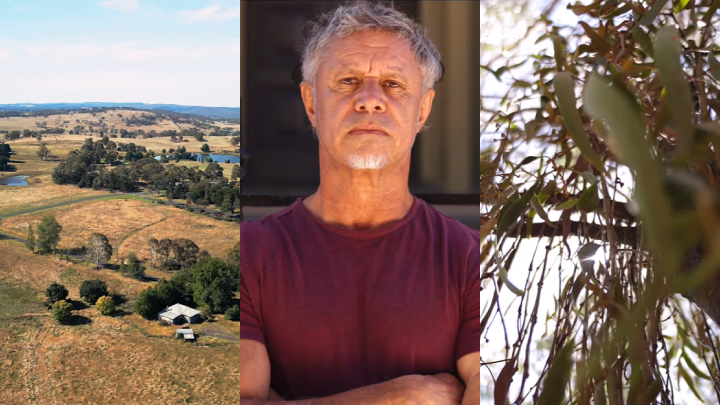
In January this year, you commenced occupying a 2,000-acre property held by Charles Sturt University, which is on Wiradjuri Country. You replaced the locks and erected a sign, declaring “Wiradjuri Nation Sovereignty Lands – no unauthorised entry permitted”.
You’re reason for reoccupying the property is based on the finding of the March 2024 Federal Court case Dungog Shire Council versus Attorney General of New South Wales, which found an issue with the 1823 Dungog grant of land tenure that leads to native title not having been extinguished.
Uncle Paul, can you explain why the outcome of this court case led you to reoccupy the land that Charles Sturt University claims as its own?
The case found that even though there was an over 2,000 acre land grant given in 1823 by Governor Brisbane to the colonials, it was illegal, as it had no written authority from the British king of the time, King Edward.
This happened in the early 1820s. Australia wasn’t Australia then. It was a colony. This was before states and territories. This was at a time of a lot of warfare, genocide and massacres, right across the colony because of land and occupation by the colonials.
In 1823, Governor Brisbane was feeling pressured by the colonials, who were looking to get more access to land and bigger property size.
The two previous governors had not given grants of more than 200 acres, so the pressure was on Governor Brisbane to change the past policy, and he started giving out land grants well over 200 acres.
When we look at Wiradjuri lands, the lands of the Wiradjuri Nation, my lands, this was the second nation invaded after the Sydney mob were decimated by the occupation and then land grants were made.
We were the second nation to be invaded, to be decimated by colonisation, and Brisbane was giving out illegal land grants of over 200 acres of land owned by the Wiradjuri Nation.
You say the circumstances of your claim over the 2,000 acre block of land that Charles Sturt claims as it owns, calls for “a reverse Mabo” type of case.
Can you explain what you mean by this?
Being arrested was my strategy, because poor old Uncle Eddie Mabo, everyone before me, even the recent Yunupingu decision in the High Court, they all had to show evidence that the land was their land.
I went onto land that I know is my 2,000 acres of Wiradjuri land. I know this land was illegally given away by Governor Brisbane in 1823, as it was an illegal process.
I know that by going out and occupying my land, that it is now up to the lessees, Charles Sturt University and the Crown, to show why they arrested me and had me charged with trespass on this land.
They have to produce the evidence to show they own the land, not me. That is the difference between me and Uncle Eddie Mabo, the recent Yunupingu case and every other Aboriginal court case until this day.
I don’t have to prove my claim in court. It is on the Crown. It is on Charles Sturt University to show legal proof of why I was arrested.
You were arrested on 2 February and spent eight hours in a cell, after you received a trespass notice on 31 January. You’re now facing charges of trespass and property damage of which you pleaded not guilty to in Orange Local Court on 6 February.
After a brief hearing last week, your case has been adjourned until 23 April.
So, how is the case going? Will the university have to attempt to prove lawful title over the land?
They have to because the police arrested me for trespassing. So, they have got to show evidence as to why they arrested me. It is that simple.
It is on Charles Sturt University and the Crown now.
So, does the outcome of the Dungog case and the way you’ve attempted to make your claim over the parcel of land open it up for other Aboriginal nations to make such claims in this manner now?
Yes. There are over three hundred nations across Australia, and they can all undertake the legal process that I am taking. But it does take some balls to get arrested.
Now, we are turning the proof back on the Crown. They have got to prove it. It is not on us as nations.
Other nations can do this. I am hoping that there are other warriors out there that are going to step up and do this for their nations.
So, the Dungog case reveals that there are other such claims to be made?
Yes. The funny thing about the Dungog case is that it was the Crown versus the Crown. In Australia, there are three Crowns or governments: local, state and federal.
On this occasion, for the first time in Australia, one Crown, the local government Crown, took on the NSW government Crown and lost.
Dungog Local Council claimed that when the last member of the original grantee family had died without any beneficiary, the council had the legal right as Crown to have the lands handed back to them.
But the NSW government said this was not the case because the land was NSW Crown land.
The case then involved having to go back to the original land grants involving the 2,000-acre property, and they found there was no authority from the king. So, today, this country is still under the authority of the British Crown.
There was no approval for land over 200 acres to be granted or approved by Governor Brisbane back in 1823.
Lastly, Uncle Paul, you continue to assert your right to the land based on unbroken Wiradjuri custodianship, and you are back in court at the end of this month. So, how do you foresee the fight shaping up from here?
Regarding my Wiradjuri sovereign lands, I can only do this as a Wiradjuri descendant of Windradyne of the Wiradjuri Nation.
Windradyne is a renowned war hero, who was documented by Governor Brisbane back in 1824. War was declared on the Wiradjuri, and Windradyne led the guerilla-type fighting that was documented in the colonial history books.
From that time, in the early 1820s, when we had war declared on us, as the Wiradjuri Nation, and to this day, I cannot find any other nation having been documented in the journals of the day that had martial law declared upon them, as the Wiradjuri had declared upon us.
Because of this documented history, Windradyne or no Wiradjuri ancestor since then has ever signed over Wiradjuri land. Whether you call it a treaty or a land use agreement, there is nothing to this day.
I’m making the Crown accountable, and I’m doing it by beating them at their own legal game, which they say means we have to prove our claim every time.
Well, no, we don’t. It’s back on you this time. You should provide the written evidence of the Wiradjuri ever ceding our sovereignty since war was declared.
But also, it should be shown via the Federal Court decision of a year ago, which found that back in 1823, the year before we had war declared on us by the same governor, he was signing out properties illegally, giving colonials over 200 acres, which is the same for the property that I took back – my own Wiradjuri land.
That land was also signed over illegally by Governor Brisbane.


